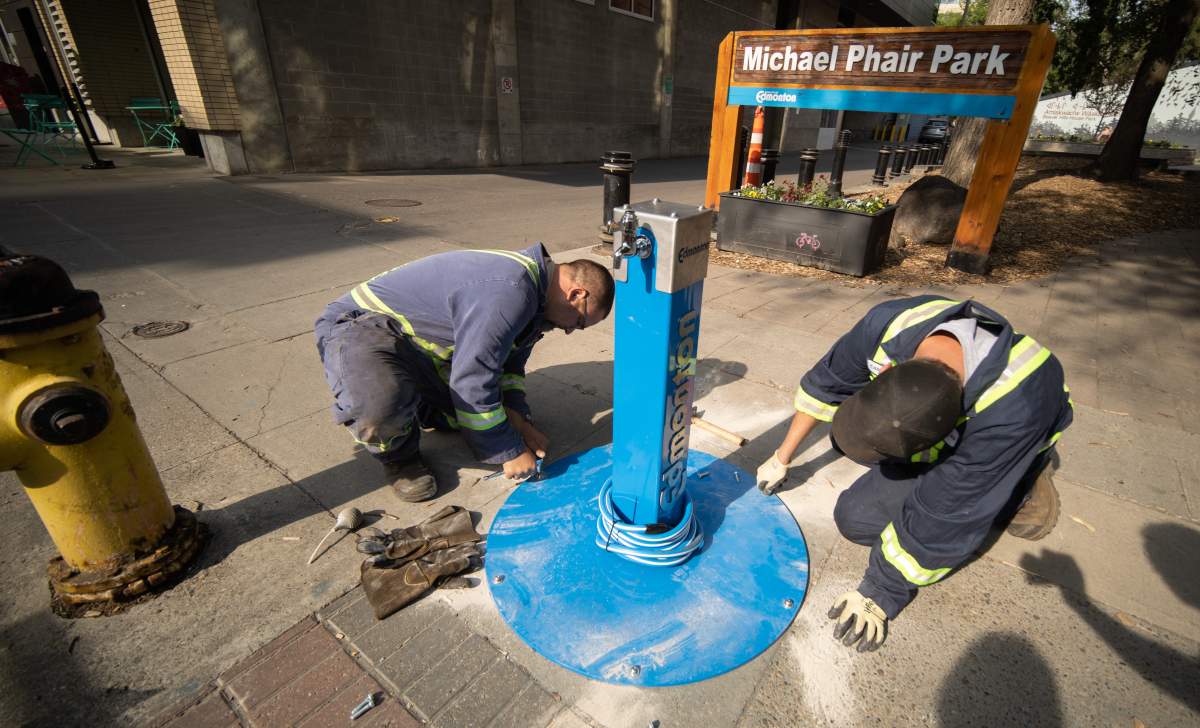Alberta Health Services said EMS responded to 85 opioid-related calls in the Edmonton zone from July 11 to 14.

That’s a high number of such calls for the area, AHS said.
A number of factors could be contributing to the rise in poisonings, AHS said, including “stronger or different supply and unusually warm weather.”
Earlier in the summer, EMS responded to 55 opioid-related calls in the Edmonton zone in two days: May 31 and June 1.
Naloxone was given during 50 of those incidents and EMS took 34 patients to hospital, AHS said.
Overdose deaths nearly doubled in Edmonton in 2020, according to Boyle Street Community Services, rising to 485 in 2020 from 267 in 2019. Data indicates they’re rising again this year.

“Year over year there’s been about a 100 per cent increase in the number of overdose deaths,” executive director Jordan Reiniger said on May 25, following three overdose deaths in downtown Edmonton on May 21.
“This is the latest shocking incident in a trend that we’re seeing of a significant number of overdoses across the city at all our sites,” Reiniger said.
Boyle Street is still concerned with the high rate of overdoses in Edmonton.

Get weekly health news
Communications co-ordinator Freya Hammond-Thrasher said Friday that weather and contaminated drug supply continue to elevate the danger.
“We were concerned back in June when those numbers were spiking,” she said. “We’re still concerned.
“Heat and dehydration can increase the risk of overdose.
“The drug source continues to be affected by the pandemic… Borders were closing… That does affect the street supply.”
Hammond-Thrasher praised the increase in collaborative efforts with the city and other non-profit partners for projects like the one involving fire hydrant water fountains.
She also said there’s been more interest in Boyle Street’s naloxone training. Businesses and individuals are signing up to learn how the overdose-reversal drug works and how to use it.
On June 9, the province announced a one-year pilot project in Edmonton in response to the overdose crisis that will see $1.5 million spent on nasal naloxone kits and $2.1 million over three years for 35 additional medical detox beds.

But advocates say more is needed.
Ginetta Salvalaggio, an Edmonton physician who specializes in addictions, said Alberta really needs an urgent and coordinated emergency response to overdose deaths.
“I’m a little underwhelmed, particularly with the nasal naloxone. This is not a new or innovative strategy; it’s tech. I think it’s a distraction; it’s not a coordinated response.
“It doesn’t really address the meat of the matter.”
Boyle Street is calling on government and community partners, including the Edmonton Police Service, Alberta Health and Alberta Health Services, to help create an emergency coordinated response and command centre to the overdose crisis involving police, AHS and the provincial government, quicker and more fulsome data (including location information) on overdoses.
The social agency would also like to see all front-line social workers have access to naloxone kits and more outreach programming.
AHS says if you or someone you care about needs help related to substance use, you can call the Addiction Helpline for resources in your area at 1-866-332-2322.
In an emergency, call 9-1-1 or go directly to your nearest emergency department.
The Mental Health Helpline is available at 1-877-303-2642.
If you are going to use illegal drugs, AHS says:
- Avoid using while alone
- Ask someone to check on you or use while on the phone with a trusted person able to call for assistance in the event of an overdose.
- Use supervised consumption services (SCS) if possible.
- Always do a test dose to check the potency or strength of the drug.
- Know the signs and symptoms of poisoning/overdose and call 9-1-1 always for direction and support.
- Carry a naloxone kit and know to use it to respond to a suspected opioid poisoning.
- Connect with your local harm reduction, health and social services agencies (e.g., income support, housing).
- Reach out to available substance use treatment, recovery-oriented supports (e.g., opioid agonist therapy, specialty addiction recovery programs), and mental health services.






Comments